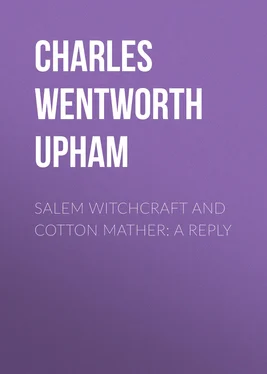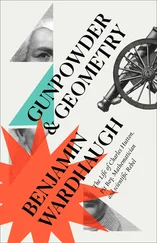Charles Wentworth Upham - Salem Witchcraft and Cotton Mather - A Reply
Здесь есть возможность читать онлайн «Charles Wentworth Upham - Salem Witchcraft and Cotton Mather - A Reply» — ознакомительный отрывок электронной книги совершенно бесплатно, а после прочтения отрывка купить полную версию. В некоторых случаях можно слушать аудио, скачать через торрент в формате fb2 и присутствует краткое содержание. Жанр: foreign_prose, История, foreign_edu, foreign_antique, на английском языке. Описание произведения, (предисловие) а так же отзывы посетителей доступны на портале библиотеки ЛибКат.
- Название:Salem Witchcraft and Cotton Mather: A Reply
- Автор:
- Жанр:
- Год:неизвестен
- ISBN:нет данных
- Рейтинг книги:3 / 5. Голосов: 1
-
Избранное:Добавить в избранное
- Отзывы:
-
Ваша оценка:
- 60
- 1
- 2
- 3
- 4
- 5
Salem Witchcraft and Cotton Mather: A Reply: краткое содержание, описание и аннотация
Предлагаем к чтению аннотацию, описание, краткое содержание или предисловие (зависит от того, что написал сам автор книги «Salem Witchcraft and Cotton Mather: A Reply»). Если вы не нашли необходимую информацию о книге — напишите в комментариях, мы постараемся отыскать её.
Salem Witchcraft and Cotton Mather: A Reply — читать онлайн ознакомительный отрывок
Ниже представлен текст книги, разбитый по страницам. Система сохранения места последней прочитанной страницы, позволяет с удобством читать онлайн бесплатно книгу «Salem Witchcraft and Cotton Mather: A Reply», без необходимости каждый раз заново искать на чём Вы остановились. Поставьте закладку, и сможете в любой момент перейти на страницу, на которой закончили чтение.
Интервал:
Закладка:
It is noticeable that the Goodwin children, like their imitators at Salem Village, the "afflicted," as they were called, were careful, except in certain cases of emergence, not to have their night's sleep disturbed, and never lost an appetite for their regular meals. I cannot but think that if the Village girls had, once in a while, like the Goodwin children, been compelled to go for a day or two upon very short allowance, it would have soon brought their "sport" to an end.
Nothing is more true than that, in estimating the conduct and character of men, allowances must be made for the natural, and almost necessary, influence of the opinions and customs of their times. But this excuse will not wholly shelter the Mathers. They are answerable, as I have shown, more than almost any other men have been, for the opinions of their time. It was, indeed, a superstitious age; but made much more so by their operations, influence, and writings, beginning with Increase Mather's movement, at the assembly of the Ministers, in 1681, and ending with Cotton Mather's dealings with the Goodwin children, and the account thereof which he printed and circulated, far and wide. For this reason, then, in the first place, I hold those two men responsible for what is called "Salem Witchcraft."
I have admitted and shown that Cotton Mather originally relied only upon prayer in his combat with Satanic powers. But the time was at hand, when other weapons than the sword of the Spirit were to be drawn in that warfare.
IV
No instance of the responsibility of particular persons for the acts of a Government, in the whole range of history, is more decisive or unquestionable, than that of the Mathers, father and son, for the trials and executions, for the alleged crime of Witchcraft, at Salem, in 1692.
Increase Mather had been in England, as one of the Agents of the Colony of Massachusetts, for several years, in the last part of the reign of James II. and the beginning of that of William and Mary, covering much of the period between the abrogation of the first Charter and the establishment of the Province under the second Charter. Circumstances had conspired to give him great influence in organizing the Government provided for in the new Charter. His son describes him as "one that, besides a station in the Church of God, as considerable as any that his own country can afford, hath for divers years come off with honor, in his application to three crowned heads and the chiefest nobility of three kingdoms."
Being satisfied that a restoration of the old Charter could not be obtained, Increase Mather acquiesced in what he deemed a necessity, and bent his efforts to have as favorable terms as possible secured in the new. His colleagues in the agency, Elisha Cooke and Thomas Oaks, opposed his course—the former, with great determination, taking the ground of the "old Charter or none." This threw them out of all communication with the Home Government, on the subject, and gave to Mr. Mather controlling influence. He was requested by the Ministers of the Crown to name the officers of the new Government; and, in fact, had the free and sole selection of them all. Sir William Phips was appointed Governor, at his solicitation; and, in accordance with earnest recommendations, in a letter from Cotton Mather, William Stoughton was appointed Deputy-governor, thereby superceding Danforth, one of the ablest men in the Province. In fact, every member of the Council owed his seat to the Mathers, and, politically, was their creature. Great was the exultation of Cotton Mather, when the intelligence reached him, thus expressed in his Diary: "The time for favor is now come, yea, the set-time is come. I am now to receive the answers of so many prayers, as have been employed for my absent parent, and the deliverance and settlement of my poor country. We have not the former Charter, but we have a better in the room of it; one which much better suits our circumstances. And, instead of my being made a sacrifice to wicked rulers, all the Councillors of the Province are of my father's nomination; and my father-in-law, with several related to me, and several brethren of my own Church, are among them. The Governor of the Province is not my enemy, but one whom I baptized, namely, Sir William Phips, and one of my flock, and one of my dearest friends."
The whole number of Councillors was twenty-eight, three of them, at least, being of the Mather Church. John Phillips was Cotton Mather's father-in-law. Two years before, Sir William Phips had been baptized by Cotton Mather, in the presence of the congregation, and received into the Church.
The "set-time," so long prayed for, was of brief duration. The influence of the Mathers over the politics of the Province was limited to the first part of Phips's short administration. At the very next election, in May, 1693, ten of the Councillors were left out; and Elisha Cooke, their great opponent, was chosen to that body, although negatived by Phips, in the exercise of his prerogative, under the Charter.
Increase Mather came over in the same ship with the Governor, the Nonsuch , frigate. As Phips was his parishioner, owed to him his office, and was necessarily thrown into close intimacy, during the long voyage, he fell naturally under his influence, which, all things considered, could not have failed to be controlling. The Governor was an illiterate person, but of generous, confiding, and susceptible impulses; and the elder Mather was precisely fitted to acquire an ascendency over such a character. He had been twice abroad, in his early manhood and in his later years, had knowledge of the world, been conversant with learned men in Colleges and among distinguished Divines and Statesmen, and seen much of Courts and the operations of Governments. With a more extended experience and observation than his son, his deportment was more dignified, and his judgment infinitely better; while his talents and acquirements were not far, if at all, inferior. When Phips landed in Boston, it could not, therefore, have been otherwise than that he should pass under the control of the Mathers, the one accompanying, the other meeting him on the shore. They were his religious teachers and guides; by their efficient patronage and exertions he had been placed in his high office. They, his Deputy, Stoughton, and the whole class of persons under their influence, at once gathered about him, gave him his first impressions, and directed his movements. By their talents and position, the Mathers controlled the people, and kept open a channel through which they could reach the ear of Royalty. The Government of the Province was nominally in Phips and his Council, but the Mathers were a power behind the throne greater than the throne itself. The following letter, never before published, for which I am indebted to Abner C. Goodell, Esq., Vice-president of the Essex Institute, shows how they bore themselves before the Legislature, and communicated with the Home Government.
"My Lord:
"I have only to assure your Lordship, that the generality of their Majesties subjects (so far as I can understand) do, with all thankfulness, receive the favors, which, by the new Charter, are granted to them. The last week, the General Assembly (which, your Lordship knows, is our New England Parliament) convened at Boston. I did then exhort them to make an Address of thanks to their Majesties; which, I am since informed, the Assembly have unanimously agreed to do, as in duty they are bound. I have also acquainted the whole Assembly, how much, not myself only, but they, and all this Province, are obliged to your Lordship in particular, which they have a grateful sense of, as by letters from themselves your Lordship will perceive. If I may, in any thing, serve their Majesties interest here, I shall, on that account, think myself happy, and shall always study to approve myself, My Lord,
Читать дальшеИнтервал:
Закладка:
Похожие книги на «Salem Witchcraft and Cotton Mather: A Reply»
Представляем Вашему вниманию похожие книги на «Salem Witchcraft and Cotton Mather: A Reply» списком для выбора. Мы отобрали схожую по названию и смыслу литературу в надежде предоставить читателям больше вариантов отыскать новые, интересные, ещё непрочитанные произведения.
Обсуждение, отзывы о книге «Salem Witchcraft and Cotton Mather: A Reply» и просто собственные мнения читателей. Оставьте ваши комментарии, напишите, что Вы думаете о произведении, его смысле или главных героях. Укажите что конкретно понравилось, а что нет, и почему Вы так считаете.












